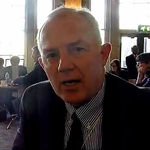Automated report writing
 I have never met a teacher who enjoys writing reports. If you have one or two small groups, it’s not too bad, but if you have ten different groups of thirty kids, crunching out 300 reports is a bind. And, often, a pressured bind at that, shoehorned between exam results and end of term. But with any luck, a new breed of software could spell the end of such drudgery.
I have never met a teacher who enjoys writing reports. If you have one or two small groups, it’s not too bad, but if you have ten different groups of thirty kids, crunching out 300 reports is a bind. And, often, a pressured bind at that, shoehorned between exam results and end of term. But with any luck, a new breed of software could spell the end of such drudgery.
Blogging on February 29 2012
 I’ve always felt a bit sorry for the people whose birthday falls on February 29th – it must be terrible, for example, on your 28th birthday to be given presents suitable for a four-year old. Seriously, though, it must be a bit depressing to have the chance to celebrate your birthday on the proper date only every four years. But this leap year, they can celebrate in style, with a blog post!
I’ve always felt a bit sorry for the people whose birthday falls on February 29th – it must be terrible, for example, on your 28th birthday to be given presents suitable for a four-year old. Seriously, though, it must be a bit depressing to have the chance to celebrate your birthday on the proper date only every four years. But this leap year, they can celebrate in style, with a blog post!
ICT and small businesses: the brief
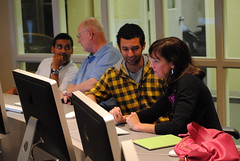 It is quite understandable that when people talk of the contribution that the business world can make to ICT lessons, they tend to think of big business. And why wouldn’t they? Big companies often have the money to finance the production of nice-looking resources, or even to provide people to spend a day in school running a simulation of some kind. However, my experience of talking to students in lessons is that small businesses, such as mine, have much to offer too. I thought I'd explore some ways in which that can happen, in an occasional series.
It is quite understandable that when people talk of the contribution that the business world can make to ICT lessons, they tend to think of big business. And why wouldn’t they? Big companies often have the money to finance the production of nice-looking resources, or even to provide people to spend a day in school running a simulation of some kind. However, my experience of talking to students in lessons is that small businesses, such as mine, have much to offer too. I thought I'd explore some ways in which that can happen, in an occasional series.
Internet addiction: another flawed study
 You’d think people would have better things to do than do pointless surveys from which they then draw unlikely conclusions. Still, it keeps them out of mischief I suppose.
You’d think people would have better things to do than do pointless surveys from which they then draw unlikely conclusions. Still, it keeps them out of mischief I suppose.
5 ways to develop critical thinking in ICT
 How do you encourage pupils and students to think critically in the context of educational technology? Although we can devote a lot of time and energy to setting up the "right environment", I can't help thinking that really it all comes down to some pretty simple questions, and very straightforward approaches.
How do you encourage pupils and students to think critically in the context of educational technology? Although we can devote a lot of time and energy to setting up the "right environment", I can't help thinking that really it all comes down to some pretty simple questions, and very straightforward approaches.
What I did over half-term
 As there are no doubts hundreds (maybe even thousands) of school children bent over laptops writing about what they did over half-term, I thought I might as well join them. I should love to be able to report that I accomplished what I’d set out to do, which was absolutely nothing. I reckoned that as most of the country’s teachers were (supposedly) having a break, I could do so too. Unfortunately, a malignant Fate, to use Dornford Yates’ wonderful phrase, decreed otherwise.
As there are no doubts hundreds (maybe even thousands) of school children bent over laptops writing about what they did over half-term, I thought I might as well join them. I should love to be able to report that I accomplished what I’d set out to do, which was absolutely nothing. I reckoned that as most of the country’s teachers were (supposedly) having a break, I could do so too. Unfortunately, a malignant Fate, to use Dornford Yates’ wonderful phrase, decreed otherwise.
ICT consultant or ICT interim manager?
 What are the differences between a consultant and an interim manager?
What are the differences between a consultant and an interim manager?
It may be the case that you do not need to appoint a full-time employee for the post of educational technology manager.
Using an ICT consultant
Computer Science courses should be left to the experts: teachers
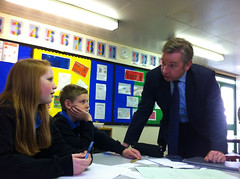 It’s astonishing how everyone is an expert on school education these days. Everyone, that is, except the people who actually work in and with schools. The latest half-baked idea appeared in the BETT opening speech by Michael Gove, the Education Secretary for England & Wales. Here’s what he said:
It’s astonishing how everyone is an expert on school education these days. Everyone, that is, except the people who actually work in and with schools. The latest half-baked idea appeared in the BETT opening speech by Michael Gove, the Education Secretary for England & Wales. Here’s what he said:
Universities, businesses and others will have the opportunity to devise new courses and exams. In particular, we want to see universities and businesses create new high quality Computer Science GCSEs, and develop curricula encouraging schools to make use of the brilliant Computer Science content available on the web.
This is a dreadful idea for several reasons.
ICT: something to be ashamed of?
Found on the web: 02/08/2012 (a.m.)
-
Looks like an interesting collection of stats and reports. There's bound to be something here for your next talk, or to get a discussion going with your pupils.
Digital Learning Day
An interview with Julia Skinner
 I had the privilege of meeting, for the first time, Julia Skinner at the recent BETT show. Julia tweets as @theheadsoffice, and is the instigator of the 100 Word Challenge, which has been instrumental in encouraging many pupils to engage in, and enjoy, writing.
I had the privilege of meeting, for the first time, Julia Skinner at the recent BETT show. Julia tweets as @theheadsoffice, and is the instigator of the 100 Word Challenge, which has been instrumental in encouraging many pupils to engage in, and enjoy, writing.
Can an ICT curriculum be boring?
Two changes to the ICT in Education website
A Teen's View of "Their Space" and Internet Safety
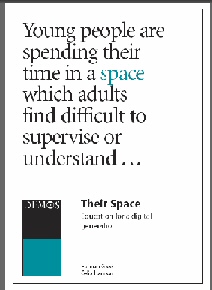 In 2007, the British think tank, Demos, published its report entitled “Their Space”. According to the authors,
In 2007, the British think tank, Demos, published its report entitled “Their Space”. According to the authors,
This report is the result of nine months of work that focused specifically on understanding how children and young people use new technologies.
The review below was written soon after its publication, by Sarah Hillier, who was at that time a teenager. I’ve just re-read her article, and I think its observations and incisiveness – not to mention the beauty of her writing – have stood the test of time. The article which follows has only been modified slightly from the original. I hope you enjoy it.
The BETT Show from a Canadian’s perspective: an interview with Vincent Jansen
BETT 2012 Round-up
 I thought it might be interesting to collate some of the blog posts that have been written about BETT 2012, before it recedes into a distant memory. First, though, here’s a Wordle of the trends that people who responded to my BETT survey spotted. I haven’t edited the text, so there are some superfluous words, like “see”.
I thought it might be interesting to collate some of the blog posts that have been written about BETT 2012, before it recedes into a distant memory. First, though, here’s a Wordle of the trends that people who responded to my BETT survey spotted. I haven’t edited the text, so there are some superfluous words, like “see”.
3D and haptics in education
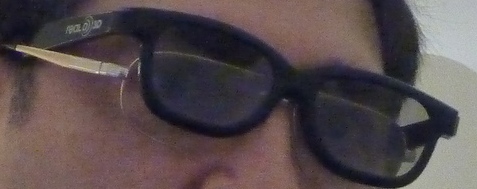 Unless you’ve been walking around with a bucket over your head for the past year or three, you must have noticed that 3D is definitely the “in” thing. It’s almost de rigueur for new movies to be in 3D, and there is even at least one smartphone which has a 3D display. But what about educational applications?
Unless you’ve been walking around with a bucket over your head for the past year or three, you must have noticed that 3D is definitely the “in” thing. It’s almost de rigueur for new movies to be in 3D, and there is even at least one smartphone which has a 3D display. But what about educational applications?

